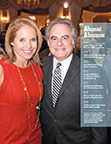Knowing How to Sweeten the Deal
Printer Friendly Version There’s a running joke at the offices of Wachtell, Lipton, Rosen & Katz that David Katz ’88 showed up as a summer associate in 1987 and never left. “People would make fun of me because I’d show up to class in a suit,” says Katz, an adjunct professor at NYU Law who has taught Mergers and Acquisitions since 1993. “I was commuting back and forth to the office, not the library or the dorm.”
There’s a running joke at the offices of Wachtell, Lipton, Rosen & Katz that David Katz ’88 showed up as a summer associate in 1987 and never left. “People would make fun of me because I’d show up to class in a suit,” says Katz, an adjunct professor at NYU Law who has taught Mergers and Acquisitions since 1993. “I was commuting back and forth to the office, not the library or the dorm.”
It has been 25 years since he got his foot in the door of the prestigious law firm, best known for its mergers and acquisitions practice, and he never did leave. Katz has been earning his paycheck, too: American Lawyer named Katz a dealmaker of the year in 2005 for his representation of Sanofi-Synthelabo in its $68 billion acquisition of Aventis. Last year he was again named an American Lawyer dealmaker of the year and Who’s Who Legal mergers and acquisitions lawyer of the year—for the fourth time in a row—both for representing natural gas provider El Paso in its $37.4 billion acquisition by rival Kinder Morgan that was announced last October. The combined entity is the largest operator of natural gas pipeline in the country, with more than 80,000 miles of pipe.
Although not the largest deal of Katz’s career, it was nevertheless the largest deal in the world in 2011. The most interesting thing about it: If it hadn’t happened, that would have been just fine with Katz and his client. Indeed, the alternative—a taxfree spin-off of El Paso’s gas exploration and production business to shareholders— was already in process. In the M&A world, that’s known as having a strong negotiating position. Katz smiles as he remembers El Paso’s stance from the very start: “It gave us the ability to say, ‘Look, you can negotiate with us and give us the price we want, or we will just go on our merry way.’”
A little background: In February 2011, Kinder Morgan successfully completed the largest-ever initial public offering for a private equity–backed company, raising a $2.9 billion war chest. It was looking to do a deal, and El Paso was in its sights.
Meanwhile, El Paso was minding its own business. In May 2011, the company announced a plan to separate into two companies—the pipeline business as well as the tax-free spin-off of the company’s E&P business. The idea was to give shareholders the choice of whether they wanted to own the two different businesses or to sell their shares of either. That August, El Paso filed a registration statement for the spin-off with the Securities and Exchange Commission. The next day, Kinder made an unsolicited offer of $25.50 per share for El Paso—a 35 percent premium to El Paso’s closing price.
At that point, Katz and his partners at Wachtell, Lipton became a crucial part of the discussions. (The six key members of Katz’s Wachtell team included tax partner Jodi Schwartz (LL.M. ’87).)
“The role of the corporate lawyer has changed quite a bit over the last 20 years,” says Katz from his corner office on the 27th floor of the CBS building. The room is literally stuffed to capacity with deal toys as well as a growing number of awards and framed news articles. He has carved space behind his desk, however, for two signed Peanuts comic strips. “We’re much more involved in the business aspects of a deal in addition to the legal aspects,” he continues. “And there are a lot of business issues. How do you get the best price? What strategy do you use? How do you counter other bids? Are they going to go hostile or not? You end up holding hands with a lot of different people.”
At the end of the day, however, there are really only two questions: Will the deal get done? And on what terms? Katz says the job of the deal lawyer is to help the client achieve as much certainty as it can on both fronts—certainty of value and certainty of consummation. Katz used the alternative of the spin-off as leverage in getting as much certainty of consummation as he could possibly get. And he got a lot.
“It would have been harder if they’d come knocking right after we’d announced the spin-off, but we’d been at it for several months,” he says. “We had an alternative we could pursue unilaterally.”
The biggest risk? Financing the deal. “We were not prepared to let them proceed without having an agreement that they would get the financing done,” says Katz. It proved a non-issue, as Barclays eventually provided $11.5 billion in financing.
Given the size of the combined companies, there was also potential for antitrust issues. Facing Kinder counsel Thomas Roberts of Weil, Gotshal & Manges across the negotiating table, Katz obtained what is known as a hell or high water provision that ensured Kinder Morgan would do what was necessary for regulatory authorities to approve the deal.
El Paso sought a so-called standstill agreement that would have precluded Kinder Morgan from going hostile had negotiations faltered. The Kinder team balked but eventually agreed to limited due diligence so as to expedite negotiations over price.
After weeks of back-and-forth, agreement was reached on October 16 for a deal at $25.91 per El Paso share, plus a sweetener of warrants that brought the total to $26.87, a 37 percent premium to El Paso’s share price at the time. The deal finally closed on May 24, 2012.
“A mistake people frequently make is to draw lines in the sand when they don’t really have an answer as to how to bridge a gap,” Katz says. “We had a gap in value. And the parties were pretty set on what each side was going to accept. But nobody knew exactly what the warrant was going to be worth over time, so it allowed us to bridge the gap.”
As luck, or deft lawyering, would have it, Kinder Morgan’s stock price has moved up since signing, making the warrants much more valuable.
—
